The Return of the Liberals
More Democrats are calling themselves "liberal" than they have in years. Republicans, too.
Americans who identify with the Democratic Party have moved substantially to the left even since the last election.
Gallup’s Frank Newport (“Democrats in the U.S. Shift to the Left“):
Democratic candidates for the 2016 presidential nomination face a significantly more left-leaning party base than their predecessors did over the last 15 years. Forty-seven percent of Democrats and Democratic-leaning independents now identify as both socially liberal and economically moderate or liberal. This is compared with 39% in these categories in 2008, when there was last an open seat for their party’s nomination, and 30% in 2001.
Here we see the trend in graphic form:
Newport continues:
This combined group of Democrats consists of 25% who are pure liberals — identifying as liberal on both social and economic issues — and 22% who are social liberals but moderate on the economy. At the other end of the ideological spectrum, a scant 7% of Democrats are socially and economically conservative. Most of the rest of Democrats have more mixed ideological leanings, with 18% moderate on both social and economic issues, and 12% socially moderate or liberal but economically conservative.
These data are from Gallup’s annual Values and Beliefs poll, which since 2001 has included questions asking Americans to rate themselves as conservative, moderate or liberal on social and economic issues. The trends for the entire country show a shift toward more liberal self-identification, and that trend is even more pronounced among Democrats on social issues. More than half of Democrats (53%) describe themselves as socially liberal at this point, up from 35% in 2001. On the economic front, Democrats remain most likely to say they are moderate, but among the rest who don’t call themselves moderate, economically liberal has become a more frequent self-label than economically conservative.
He sees serious implications:
Americans’ perceptions of their social and economic views on the ideological spectrum are quite general, and such labels don’t always translate directly into specific policy and issues positions. Ideological labels, however, are helpful in understanding voters’ positioning in the election year to come. The shift leftward appears to fit with trends on very specific issues such as same-sex marriage.
Primary voters can vary from state to state, but broadly these national trends broadly suggest that Democratic candidates can be somewhat more left-leaning in their policy and issue prescriptions in the 2016 election campaign than in the past.
Democratic front-runner Hillary Clinton faces a more liberal base than she did when she last ran for president in 2008, and no doubt will be calibrating her positions accordingly. The shift in the electorate may help explain the attention being garnered by long-shot candidate Sen. Bernie Sanders of Vermont who has used the label “socialist” to describe himself and who is avowedly liberal across the board. Two other announced Democratic candidates — former Maryland Gov. Martin O’Malley and former Republican senator from Rhode Island Lincoln Chafee — have taken liberal positions in the past. In the 2016 election, they will be seeking to connect with the electorate on that basis, while also attempting to position themselves against Clinton on specific issues.
What’s not clear from the data is whether the shift reflects changed policy preferences or simply a renewed willingness to identify under the “liberal” banner. Certainly, for a long time—at least since Ronald Reagan’s 1980 campaign—“liberal” had become sort of a dirty word, indicating being “soft” on crime and “weak” on national security issues. Maybe that stigma has gone away? At the same time, there has certainly been a real movement to the left on social issues, notably gay rights and even transgender acceptance. And, with the Great Recession, Occupy, and the like, there’s increased support for the use of government to level economic outcomes as well.
Interestingly, despite the widespread perception—which I share—that American politics is getting more polarized and that the Republican Party in particular has become more extreme, the polling actually shows something else. A Gallup poll last month showed fewer identifying as “conservative” than at any point since the survey started. Jeffrey Jones:
Thirty-one percent of Americans describe their views on social issues as generally liberal, matching the percentage who identify as social conservatives for the first time in Gallup records dating back to 1999.
Gallup first asked Americans to describe their views on social issues in 1999, and has repeated the question at least annually since 2001. The broad trend has been toward a shrinking conservative advantage, although that was temporarily interrupted during the first two years of Barack Obama’s presidency. Since then, the conservative advantage continued to diminish until it was wiped out this year.
The newfound parity on social ideology is a result of changes in the way both Democrats and Republicans describe their social views. The May 6-10 Gallup poll finds a new high of 53% of Democrats, including Democratic-leaning independents, describing their views on social issues as liberal.
Democrats were more likely to describe their views on social issues as moderate rather than liberal from 2001 to 2005. Since then, socially liberal Democrats have outnumbered socially moderate Democrats in all but one year.
Meanwhile, the 53% of Republicans and Republican leaners saying their views on social issues are conservative is the lowest in Gallup’s trend. The drop in Republicans’ self-identified social conservatism has been accompanied by an increase in moderate identification, to 34%, while the percentage identifying as socially liberal has been static near 10%.
Indeed, as Newport noted at the time, a growing number of Republicans were calling themselves “liberal.”
The percentage of Republicans and Republican-leaning independents who describe themselves as both social and economic conservatives has dropped to 42%, the lowest level Gallup has measured since 2005. The second-largest group of Republicans (24%) see themselves as moderate or liberal on both social and economic issues, while 20% of all Republicans are moderate or liberal on social issues but conservative on economic ones.
These data are from Gallup’s Values and Beliefs poll, which since 2001 has included questions asking Americans to rate themselves as conservative, moderate or liberal on social and economic issues. These trends show not only that Americans as a whole have become less likely to identify as social or economic conservatives, but also that Republicans’ views are changing along the same lines.
This change in recent years has been significant. The percentage of Republicans identifying as conservative on both dimensions has dropped 15 percentage points since 2012, largely offset by an increase in the percentage who identify as moderate or liberal on both dimensions. Still, the current ideological positioning of Republicans is not unprecedented; the proportion of social and economic conservatives was as low or lower from 2001 through 2005.
To be sure, 42% of Republicans–by far the largest plurality—see themselves as both economically and socially conservative. But it’s surprising to me that 24% would label themselves liberal on both dimensions and another 30 percent label themelves liberal on one of the two dimensions.
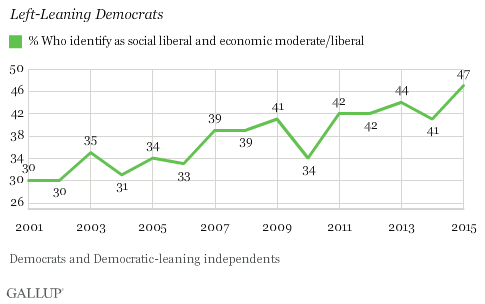

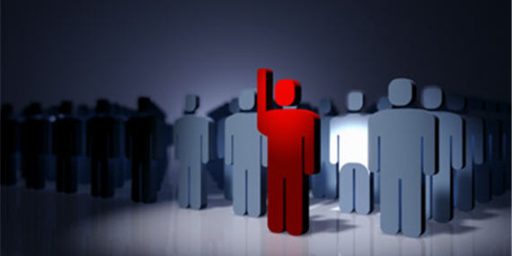

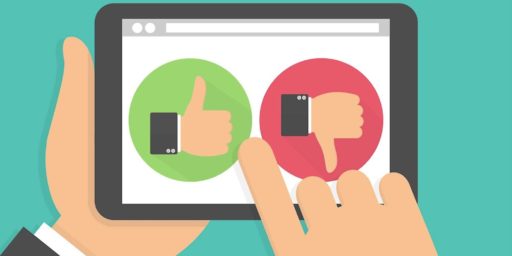
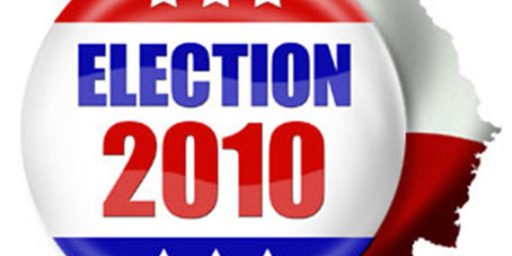
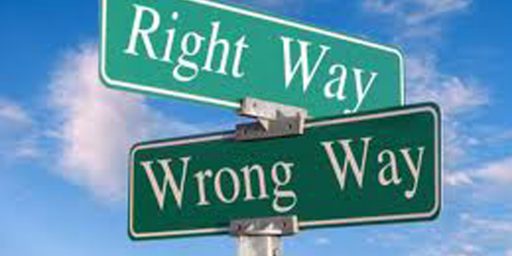
So if the 50% of the Democrats that are not liberal and the 50% of the Republicans that are not Christian conservative get together, could there be a viable centrist party?
@Mu:
No there is no room for a third, centrist party because those in the middle will always find that one issue that they disagree with and move to their natural home in the Democratic or Republican Party.
The real question is whether polls are finally started identifying blacks and Latinos are the political liberals that they vote rather than the moderate or conservatives where many on the left want to assigned them.
A better question is whether the move to the left will create more automatic Democratic Party voters and push the Democrats over the 50% automatic voting level. The Republicans can play with district lines and off-year niche issue for so long before they are overwhelmed by demographic changes in the U.S.
What is also amazing is that no one analyzes the changes from who will benefit and who will lose in the long run.
@Mu: Hell, I’m a moderate. But that’s not a policy position so much as a temperament. It’s almost impossible to build a party around “not too hot, not too cold.”
@superdestroyer: Do you seriously have nothing to contribute to the debate beyond “blame it on the blacks and Latinos”? It’s beyond tiresome to have you make the same argument in every thread on the site, regardless of topic.
@superdestroyer:
Yeah man, that’s definitely the real “question.” You nailed it.
Are polls finally started identifying minorities are the political liberals that they vote rather than moderates where many on the left want to assigned them? Inquiring minds want to know.
Most likely explanation to me is voters (finally) wanting to disassociate themselves from the extreme nuttiness and hate that has been spewing from the Republican Party and conservatives (as defined by the Ted Cruz and the Tea Party) over the last few years.
Which is somewhat ironic since the Republican Party seems, to me anyway, to have been keeping the crazy mostly in check since they became the majority.
You’re ignoring the Elephant in the room – pun intended. Republicans have become so extremely radical that any thinking person has no choice but to gravitate to so-called liberal positions.
Same-sex marriage is a perfect example. The majority of the country is in favor of their friends and relatives being able to love whoever they want to love. So it’s not a liberal position…it’s by far the moderate position of the country. The problem is that the Republicans, especially the occupants of the clown car, have become so extreme in their opposition to family values that, relatively speaking, the moderate position seems liberal.
Your mistake, as always, is looking to satisfy your both-sides-do-it fetish. Stop it. The country is polarized simply because Republicans have become absolute extremists. The are radicals pushing radical agendas. You need look no further than the clown cars reaction to Pope Frank’s Encyclical on the environment. One party is way out past the starboard rail. Once you start being honest about that, then the rest of it will make sense to you.
@James Joyner: I agree with your response to my friend Mu, a third party won’t happen. A new party may materialize when the current Republican party implodes.
As for superdestroyer he was banned from The Moderate Voice because he never added anything of value to the conversation.
When it comes to economics supply side was always a bad joke and people are beginning to realize that. Successful capitalism was always based on demand side economics. Businesses really don’t create jobs – customers do.
Mostly these polls just show most people have no clear idea what “liberal” and “conservative ” mean. After Reagan put an avuncular face on it, a lot of people started calling themselves “conservative”. A lot of people started calling themselves “libertarian” after W made “Republican” uncool. Now 40 years of conservative governance have made “conservative” uncool. So here we are, and, contra SD, we can start another turn of the wheel.
I think people would even interpret the question differently depending where they’re from and where they live.
I’m a Republican (since ’72) and temperamentally somewhat conservative. However, here in Texas I’m considered pretty liberal. In NY, where I grew up, or SF, where part of my family lives, I am considered somewhat conservative. My SF family are pretty moderate there but would be considered hard left in Texas.
So what does this all mean? Politically, for me, this all translates into voting Democratic for most of the time here in Texas. I think there are very different interpretations of liberal and conservative in different parts of the country. And differing criteria for individual interpretation of how people self-identify.
I do sense that on the liberal side of the fence that there is a rising willingness to push back on the right wing in this country and stand up for themselves.
@James Joyner:
re Superdestroyer, as a longtime reader/lurker, that is possibly one of those most relevant subjects I remember seeing regarding that particular hobby horse. It may be a distasteful opinion, but, at this point, it can’t be denied it is honestly held.
You had to be expecting that particular post as soon as you decided cover this subject – of course that could be said of any post that has the words ‘Republican’ or ‘Democrat’ in it.
@Neil Hudelson:
Liberal websites periodically run stories about how liberals are smarter than conservatives usually based upon something such as percentage of college graduates or number of years of higher education. When I read those stories, I always wonder how they deal with high school dropouts being some of the most loyal Democratic Party voters. The stories and the underlying academic studies usually deal with demographic issues by using a method to identify liberals that excludes blacks, Latinos, and the poor based on social issues. However, since blacks and Latinos have moved to being more socially liberal, it would make sense that groups that have always been very loyal Democratic Party voters are now being counted as liberal.
In addition, since being a conservative is now seen as unfashionable and lacking in status, I also assume that many people who claim to be liberal live their lives more like conservatives but learn to repeat liberal positions for personal reasons.
You guys are so depressing. What’s a pro-gun Democrat/pro-choice Republican going to vote for in years to come?
@Mu:
Dancing with the Stars?
@superdestroyer:
Hey buddy,
I really don’t give a crap; I was just making fun of your word salad. Just so we are clear, I–and I think I speak for the vast majority here–have never taken seriously any of the drivel you’ve written.
-Neil
@Mu: “So if the 50% of the Democrats that are not liberal and the 50% of the Republicans that are not Christian conservative get together, could there be a viable centrist party?”
From what I’ve gathered, there is strong support among Americans for liberal positions (increasing taxes on the rich, increasing social security, improving the safety net, etc.), right up until they are labeled as ‘liberal’ or ‘Democratic’ positions.
@gVOR08:
How could they? Not only are they context-dependent, they are also used as epithets and/or cheerleading slogans, to the point of semantic nullity.
I think it’s important to recognize that the graph at the top is at least as much about how a word is being used differently over time as it is about what people have believed over time. People assess how ‘liberal’ or ‘conservative’ they are against the norms of their place (as @Scott notes) and time. What looks liberal today looked pretty conservative in 1976, and outrageously radical in 1950.
@Barry: Nothing wrong with those positions. It’s the accompanying mind control that I have issues with. But you can’t be a libertarian and think that we’re way undertaxed in this country either.
@DrDaveT:
I like “semantic nullity.” I will quite likely steal it and use it at some point.
@c.red: “. It may be a distasteful opinion, but, at this point, it can’t be denied it is honestly held.”
Since it’s not honestly debated by him/her, I’ll disagree with the idea that he/she honestly holds it.
@Mu: “You guys are so depressing. What’s a pro-gun Democrat/pro-choice Republican going to vote for in years to come?”
Vote Democratic.
Tell me – of abortion/birth control restrictions and gun control, which has been passing for the past couple of decades and which hasn’t?
I think that the era of the “liberal cringe” is over,or at least ending . Starting in 1980 ( or really, back in 1972) liberals were identified with social policies that caused on contributed to crime, riots, social chaos, immorality, and stagflation. The cure ( so said Reagan and others) was to let businesses do whatever they want,( because efficient markets are efficient), cut taxes on the rich (because tax cuts will pay for themselves), and legislate morality (because we have to get back to the morality of the founders, which was obviously traditional Christianity.
Since then, we have had empirical evidence of whether conservative economics works-AND it doesn’t (see the 2008 financial crisis) and see the steady rise in the economic equality and economic immobility that dates back precisely to 1980.There is a reason why conservatives don’t argue policy anymore-their policies have been tried, and found not to work.
Liberals have taken heart from this, and are reclaiming the formerly discredited old label.
@Ron Beasley:
That is the single most important thing to know about economics and politics. Aggregate demand creates jobs. Wealthy-Job-Creators ™ mostly just fight over dividing the spoils.
Well that, and that the definition of these things is slippery. Being pro-marijuana legalization used to be an extremely liberal (or libertarian position). It’s almost mainstream now. My parents thing I’m “really liberal”. My co-workers think I’m “ultra-conservative”.
Honestly, I think there’s a growing tendency to just stuff labels and worry about the issues themselves.
@superdestroyer:
Yeah, it means a woman might not want to get an abortion for herself but isn’t about to tell another woman what to do with her body. I don’t smoke pot but I don’t care if you do. If you live conservatively yourself but don’t want to meddle in other people’s lives than you are a liberal.
@Barry:
I believe we’re using different values for “honestly”; after seeing four to six years (or maybe longer, I don’t really remember) of never deviating from the basic formula it is definitely firmly held and believed to be correct, so I believe it is an honestly held opinion. But I also agree with you that it has never been rigorously supported; it is unsupportable – not even getting to the racist elements – it is based on the assumptions that political beliefs should/will never change and racial politics are always a zero-sum equation, so it is silly.
I’m just not certain that I want to see it squelched entirely – if someone wants to reduce themselves to a one dimensional cut-out I feel they should be allowed to. Besides, the follow- up mocking generally has entertainment value.
One effect political scientists have studied for years is that the American public tends to be “ideologically conservative” but “operationally liberal”–in plain English, they hate government in the abstract while liking specific government programs.
I think one of the things that has been happening in recent years is that Americans are becoming more ideologically liberal, not just operationally so. This must be partly due to the millennial generation:
Of course taxing the wealthy is broadly popular with the entire electorate, not just the young, but the lack of receptiveness to bashing “big government” seems to be particular to millennials. In other words, conservative frames (not just conservative policy positions) that used to have a big impact on the electorate, are losing their power to resonate.
That’s what I suspect is going on with the increase in self-identification by the “liberal” label. The phobia of that term was, like antigovernment rhetoric and Cold War paranoia, largely a phenomenon of the Baby Boom generation that was passed on to Gen-Xers but which now appears to be fading away. It’s not so much that the public is becoming more liberal on policy (though that also happens to be true, particularly on social issues like gay marriage) as that they’re becoming a lot less receptive to conservative frames.
These two ideas are not in tension with one another.
Although fewer people are calling themselves conservative, those that still do are extreme radical right wingers.
@PJ:
I could totally see Jim Webb hoofing it with Susan Collins. Of course, they’d be out after the first show, but they would always have that one magical week together.
Wait, is Collins pro-choice? Are there any national pro-choice Republicans anymore?
I think is mostly an exercise in finding out what Americans self-identify as. Republicans had this neat idea where they decided they were going to make “liberal” a dirty word. It was a sub-project that arose from the Southern Strategy talks, I’ve been told. A young Frank Luntz was tasked with the messaging. “Tax and Spend” was beginning to wane, but “Soft On Crime” was def trending.
Basically, what is happening is that Democrats no longer fear the social cooties that come with self-identifying as “liberal.”
But I’m with C. Clavin. Wanting equal treatment under the law as it is written is not a liberal position. Wanting ourselves, or our family, friends and neighbors, to be treated just like everybody else is not a liberal position.
@de stijl:
Actually, the negative use of “liberal” seems to have arisen in the late 1960s and grown popular in the 1970s. It was used extensively in the show All in the Family. In many ways, Rob Reiner’s “Meathead” character embodied the negative stereotypes that were developing around the term: an overzealous do-gooder who’s also a bit of a patronizing snob. Gallup polls during this decade already found more self-identifying conservatives than liberals, and politicians were already running away from the term.
Ambrose Bierce had some pretty good definitions:
— The Cynic’s Word Book (1906)
@michael reynolds:
Why thank you, sir. Glad to be of service. Share and enjoy ™.
@J-Dub:
When liberal support forced busing for social engineering purposes, they are meddling in the lives of others. When liberal support separate and unequal treatment when it comes to education, employment, and contracting, they are meddling in the lives of others. When liberal purpose zoning, environmental, and preservation laws that raise the price of their own property while lower the value of others, they are meddling.
A good example of the hypocrisy of liberals is their support for higher levels of immigration and for county wide forced busing such as in Seattle, Louisville, and Wake County, NC while they send their own children to private schools. A subset of this hypocrisy is the denouncing of testing while sending their own children to schools that have admission tests, tons of periodic testing and expulsion of students who do not perform.
@c.red:
Politics beliefs will change and have change. As people want to have some relevance to policy and governance, more of them will become Democrats. Look at how the Republican primary is filled with second rate grifters and political hacks while the Hillary Clintons staff is filled with Ivy League graduates. There used to be Republicans at the Ivy Leagues but not they are totally dominated by Democrats. That means that anyone who wants to have a successful career in politics in the future will be a Democrat and had better be certain to always be on the winning side of every single issue.
What is amazing is how many people talks as if there are a set of politicians who have the skill set to increase the number of people who would identify as conservative while noticing how stupid and incompetent virtually every single Republicans is these days and that coast whites have fled the Republican Party to be in the Party of the CBC and CHC.
@superdestroyer: Gosh, SuperD, you’re such a victim. It’s amazing you can even crawl out from under the bed on a regular basis.
Oh, wait. Nevermind.
@James Joyner:
Progressive is an agenda.
Liberalis a philosophy.
Moderate is an approach.
Conservative is a phobia.